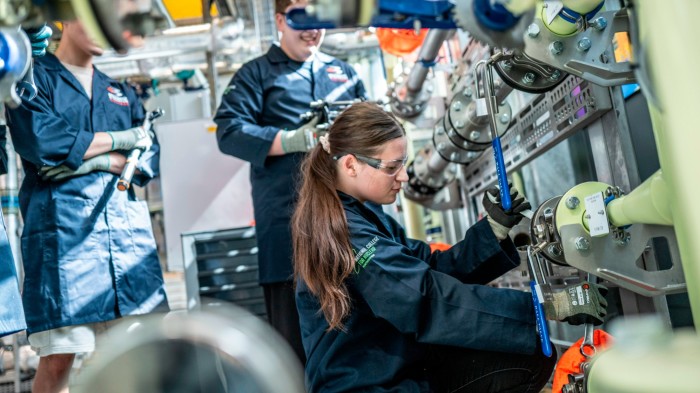Unlock the Editor’s Digest for free
Roula Khalaf, Editor of the FT, selects her favourite stories in this weekly newsletter.
The government has pledged £275mn to create new education programmes and apprenticeships to train up thousands more skilled UK workers by 2029, as part of a long-awaited industrial strategy to be unveiled on Monday.
This will include the creation of Technical Excellence Colleges and new courses in areas such as defence and engineering.
Business secretary Jonathan Reynolds said on Sunday the industrial strategy “will help transform our skills system to end the over-reliance on foreign labour, and ensure British workers can secure good, well-paid jobs in the industries of tomorrow”.
“Where past governments have watched from the sidelines as British industry has faced under-investment and opportunities have been shipped overseas, this government is leading the way,” he added.
Nigel Farage, leader of the populist Reform UK party, has been arguing for greater investment in skills and work opportunities in deprived regions, creating fresh urgency at the top of Sir Keir Starmer’s Labour party to tackle the problem. Reform is doing particularly well with voters in areas of Britain with high levels of unemployment and child poverty.
Launching Reform’s campaign for the Welsh parliament earlier this month, Farage announced that his party would focus on launching “as many trades and skills colleges as it could”.
The government’s industrial strategy will mark Starmer’s attempt to set a clear 10-year plan for boosting the British economy across its industrial heartlands.
Lowering UK energy costs to close the large gap with key EU rivals will be the centrepiece of the strategy. Discussions within government have included giving companies discounts on their energy bills when their energy costs exceed a certain percentage of turnover.
The industrial strategy will focus on eight key sectors: advanced manufacturing, clean energy, creative industries, defence, digital and technologies, financial services, life sciences, and professional and business services.
The creative industries are expected to receive a £380mn boost, including £150mn for regional mayors in Liverpool, Manchester, the West Midlands and West Yorkshire to support creative businesses in their regions.
As part of the funding for skills announced on Sunday, the government said it would roll out new short courses in high growth areas including digital and AI, as well as investing in skills in the defence sector, where government spending is set to rise.
The funding for training and apprenticeships includes £100mn specifically to boost education in engineering, which will come out of a £200mn “skills mission fund”.




